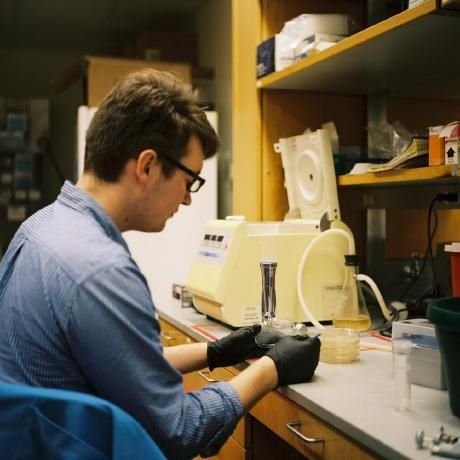The iDPCC is excited to continue spotlighting CEIRR researchers who earned poster presentation awards at the 4th Annual CEIRR Network Meeting (ANM). University of Maryland School of Medicine Postdoctoral Fellow, Louis Taylor, Ph.D., was one of the members representing the Center for Research on Influenza Pathogenesis and Transmission (CRIPT) and Matthew Frieman’s laboratory at this year’s meeting. Taylor was awarded First Place in the Immunity, Transmission, and Breadth of Protection category for his poster titled “A phage display library to evaluate antibody responses to human coronavirus spike proteins.”

Taylor has found the CEIRR program to be incredibly impactful on his training. Through both funding and collaboration, the CEIRR Network allowed him to conduct relevant and important research as a Postdoctoral Fellow. He is, “motivated to study projects that interest and challenge [him], that involve both biology and computational methods, and that have the potential to make a positive impact on human health.” Taylor’s research focuses on the importance of understanding antibody responses to coronaviruses due to their ability to evade pre-existing and vaccine-induced immune responses. Taylor created C-SPIKE, a phage immunoprecipitation sequencing (PhIP-Seq) library designed to map antibody responses to coronavirus spike proteins. C-SPIKE complements existing approaches like neutralization assays to enable deep characterization of antibody responses to coronavirus spike proteins, facilitating development of vaccines with enhanced breadth to control current and future coronavirus outbreaks. While Taylor has an extensive background studying virology and bioinformatics, he was challenged to learn more about immunology for this interdisciplinary project. He said, “it has been challenging but fulfilling to learn more through the course of this project.”
To learn more about Taylor himself, the iDPCC asked several insightful questions:
1. Who/what inspired you to go into science in general?
A. I always enjoyed science and nature when I was younger. As a child, I wanted to be an entomologist; I regularly collected insects and watched them walk around and interact in their jars. My high school biology class and teacher strongly influenced my decision to study biology in college. I’ve enjoyed studying and teaching science throughout my life and hope to be able to do more of it in the future.
2. Do you have advice for other trainees or students wanting to get started in research?
A. The best way to get started in research is to try it out. Reading about science feels very different from actually being in the lab day-to-day. Whether in an internship or summer project context, or part-time alongside studies, doing some work as a researcher is the most effective way to figure out whether it’s a career you might be interested in, and what area excites and engages you. While this is probably true of many careers, science as a whole covers a wide breadth of topics. It can be difficult to know whether a field you’re interested in is one you could work in full-time. Trying out different areas can help to identify research areas you’d be interested in working on in the future, but time spent realizing you don’t want to pursue a particular field is also very helpful.
3. What is your favorite mundane lab chore?
A. I enjoy emptying the biohazard waste bins. There’s something satisfying about having a nice empty biohazard waste container at your bench.
4. What technique, skill, or knowledge are you the “go to” person for in your lab?
A. The Frieman lab is very collaborative, lab members share their expertise and help with each other's projects. I have the most bioinformatics experience of anyone in the lab, so I frequently help process or analyze large datasets (e.g., sequencing) or help with experimental design with analysis of large datasets in mind.